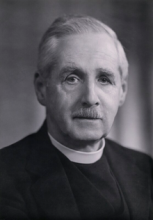John Baillie was born in Gairloch, Wester Ross, Scotland, on 6 March 1886. He was the eldest of three sons born to the Free Church minister Rev. John Baillie and his wife, Annie Macpherson. Upon his father’s death, when Baillie was just four, his mother moved with her sons to Inverness.
After finishing his schooling at the Royal Academy in Inverness, John matriculated at the University of Edinburgh in 1904. He excelled in a number of subjects, including English, but his passion rested in philosophy, where he won a number of prizes during his studies at Edinburgh. Upon completing his degree, Baillie enrolled in New College with the intention of pursuing ordination in the United Free Church. From 1908 until his completion in 1912 he spent his summers at the universities of Marburg and Jena, attending lectures by leading German philosophers and theologians. After completing his four years at New College Baillie divided his time between teaching moral philosophy at Edinburgh University and serving as a pastoral assistant at Broughton Place Church.
Two years later, in 1914, Baillie experienced a series of tragedies. His brother Peter drowned while training to serve as a missionary in India and two close friends died in World War I. In the wake of these tragedies Baillie volunteered to serve with the YMCA among British soldiers in France. Then he met Jewel Fowler, whom he married in 1919, and afterwards served as the chair of Christian theology at Auburn Theological Seminary, New York, for seven years. From 1927 until 1930 he worked at Emmanuel College, Toronto, before being appointed Roosevelt Professor of Systematic Theology at Union Seminary, New York.
Four years later Baillie accepted an invitation to return to New College at the same time his brother Donald was appointed in St Andrews. John and Donald, referred to corporately as the ‘Baillie Brothers’, exerted an enormous influence over the Church of Scotland and beyond for the next twenty years. Both brothers were known for their profound theological probing as well as deeply religious and pious practice, which led them to be held by many as among the greatest ‘mediating’ theologians of their era. Among John Baillie’s most influential works was the Diary of Private Prayer (1937) which appeared in over twenty languages.
But beyond teaching and publishing, Baillie was an ecumenist. As a student he served as a volunteer to the 1910 Edinburgh Mission Conference. He served the Faith and Order Movement and was a founding member of the British Council of Churches. Internationally, he served as a committee member for the first committee of the World Council of Churches in 1948 and was elected as one of the six presidents at the second meeting in 1954. Baillie was invited to present at a number of preeminent lecture series including to the British Association, the Bampton Lectures and the Gifford Lectures in Edinburgh.
In 1957, having already retired as professor of divinity at New College, Baillie received perhaps his greatest honour being named Companion of Honour to the queen. He never stopped working, despite repeated illness and chronic pain, and died on 29 September 1960, soon after he finished writing his Gifford lectures.
Baillie’s publications include The Interpretation of Religion (1928); The Place of Jesus Christ in Modern Christianity (1929); And the Life Everlasting (1933); A Diary of Private Prayer (1937); Our Knowledge of God (1939); Invitation to Pilgrimage (1942); The Belief in Progress (London, 1950); The Idea of Revelation in Recent Thought (1956); What Is Christian Civilization? (1945); Natural Science and the Spiritual Life (1952); The Idea of Revelation in Recent Thought (1956); Christian Devotion (1962); The Sense of the Presence of God (1962); Christian Devotion (1962); Baptism and Regeneration (1963); and A Reasoned Faith (1963).



